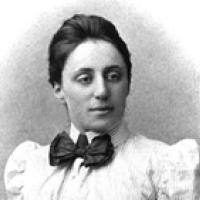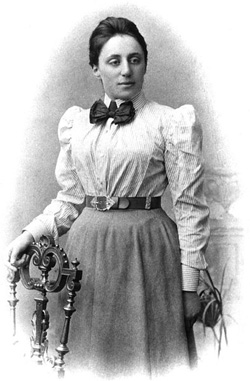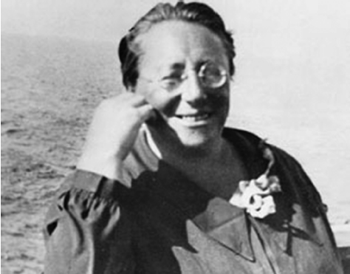

Emmy Noether
When Emmy Noether unexpectedly decided to enter university, German public opinion had just about come round to the fact that some women might, possibly, benefit from higher education. Allowing women to obtain official degrees would have been a bit much of course, but with the professor's consent they were allowed to sit in on lectures. As Noether's father, Max Noether, was an eminent professor of mathematics at Erlangen, the professors were family friends, and she was able to gain their consent. This was an unexpected direction for any young woman to take at the beginning of the twentieth century and was the first of Noether's unlikely successes against the odds in her journey to becoming one of the century's great mathematicians.
Emmy Amalie Noether was born on 23rd March 1882 to a middle class Jewish family in the small Bavarian town of Erlangen. She was described as a "clever, friendly and rather endearing" child who grew up to love parties and dancing as well as absorbing the family atmosphere of mathematics and education. Educational opportunities at the time for a girl growing up in Germany were few, with German schools for middle-class girls being little more than finishing schools.
For three years Noether studied to pass the teacher training programme that would allow her to teach English and French in a girls school. Then at the age of eighteen, she took the unexpected decision not to become a schoolteacher and instead attend the University of Erlangen, at least in the unofficial capacity the mores of the day allowed.
In 1904, after four years of unofficial study, a relaxation in the rules finally allowed Noether to officially matriculate at Erlangen, and she went on to complete a virtuoso doctorate in 1907. With typical earthy frankness she later went on to describe her thesis as "crap". Women were not allowed to fill academic posts, so Noether spent the next eight years working for the university without pay or position and helping her increasingly frail father with his teaching duties.
David Hilbert, widely considered to be the most influential mathematician of his time, met Noether and her father when they paid an extended visit to the University of Göttingen in 1903. After her doctorate, Hilbert and Felix Klein persuaded Noether to come to Göttingen and then embarked on a long campaign to have her appointed to a faculty position in spite of a Prussian law prohibiting this. Noether was refused a university position but permitted a compromise: she could lecture but only if the lecture was listed under Hilbert's name rather than her own.
Albert Einstein wrote to Klein in 1918, "On receiving the new work from Fräulein Noether, I again find it a great injustice that she cannot lecture officially". Finally, in 1919, Noether was granted the lowest faculty rank of Privatdozent and, although still unpaid, began teaching under her own name that autumn. A few years later she was appointed to the position of "unofficial, extraordinary professor": in effect, a volunteer professor without pay or official status and she was later granted a tiny salary which was barely at subsistence level. When postwar hyperinflation destroyed the value of her small inheritance Noether had very little left to live on. She pared her life down to the essentials, "She didn't have very much money, but also she didn't care," her nephew, Herman Noether, explained. During the week, Noether ate the same dinner at the same table in the same cheap restaurant.
Noether made fundamental contributions to both pure and applied mathematics. From a physicist's perspective her most important accomplishment, now known as Noether's theorem, described the relationship between symmetries of the laws of nature and conservation principles — find out more here. Noether's Theorem also applies to many quantum systems, and this has made her contribution particularly important to the modern development of quantum theory.
In a completely different mathematical direction, Noether published a paper in 1921 called (translated into English) Theory of ideals in ring domains which has had a major influence on the development of modern algebra. Rings are fundamental abstract algebraic structures (they are particular types of groups with a second binary operation), and a class of these objects are now called Noetherian rings.

Emmy Noether
German mathematics, like much else, became highly politicised in the 1930s. Few German academics opposed Hitler's rise to power and one of Noether's research students, Werner Weber, organised a boycott of Professor Edmund Landau's classes because he was Jewish. Hitler then began firing Jewish professors from the Universities in a bid to remove Germany from the "satanic power" of the Jews. Noether was one of the first six professors fired from Göttingen because she was both Jewish and politically liberal. The expulsion of Jewish academics devastated the University of Göttingen. Hilbert, asked by a Nazi official on the state of mathematics in Göttingen replied, "Mathematics in Göttingen? There really is none any more".
Noether's friends started a frantic search to find her a university position abroad. Eventually, she was granted a temporary one-year position on a modest salary at a small women's college, BrynMawr, in the United States. Finding her a permanent position proved difficult, as there were too many Jewish refugees and too few places who wanted to hire them. By 1935 enough funds were scraped together to support Noether at a reduced salary for another two years.
Noether then went into hospital to have surgery for the removal of a large ovarian tumour. For a few days it appeared that the surgery had been successful but then she suddenly lost consciousness and died of what appeared to be a post-operative infection. Sadly, she died in exile in her early fifties at the height of her creativity and powers.
The mathematician and philosopher Hermann Weyl said of Emmy Noether during the troubled Summer of 1933 when the Nazis rose to power, "Her courage, her frankness, her unconcern about her own fate, her conciliatory spirit were, in the midst of all the hatred and meanness, despair and sorrow surrounding us, a moral solace". The challenges she faced and the climate in which she lived make Noether's mathematical achievements all the more extraordinary.
About the author
Danielle Stretch has worked for the Department of Applied Mathematics and Theoretical Physics at Cambridge University, which is also the home of Plus. Prior to that, she worked in various administrative positions for visual artists, politicians, writers and engineers. She says that working for a mathematics department has changed the way that she thinks about the subject. "Before working here I did not have any conception of how mathematical research operated or how, in a different way, it is every bit as creative and exciting as working in the arts and with its own sort of beauty".